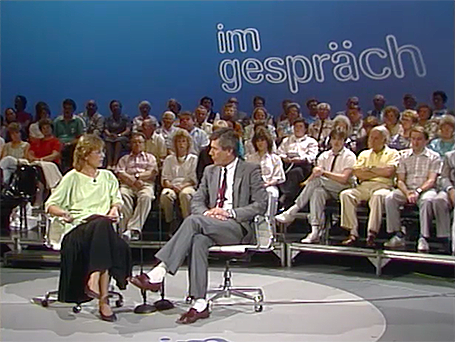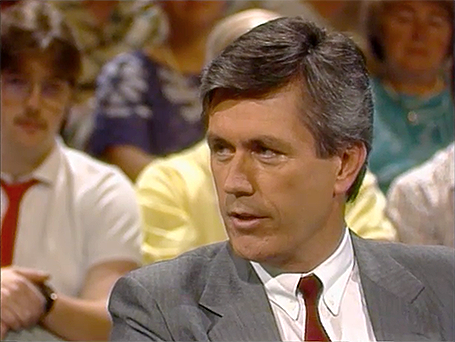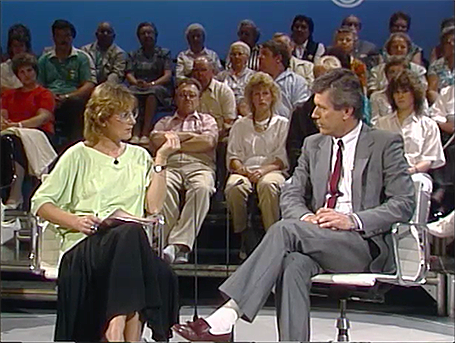I recently came across a television interview that I filmed 30 years ago, around the time of the dedication of the Frankfurt Germany Temple. As you can see, I was a much younger man then. In addition to serving as the chair of the temple committee, I also was a stake president and chief pilot of Lufthansa. It was a very busy time, indeed.
As I drove from the temple open house to the television station, I prayed in my heart that I would be able to appropriately and effectively share my thoughts about my faith and why the temple is so important to members of The Church of Jesus Christ of Latter-day Saints.
As I arrived, I was told that the interview would be only 2–3 minutes. However, when the breaking news that the station thought was going to happen didn’t materialize, they ended up extending my interview to nine minutes.
Because the interviewer didn’t expect such a long interview, we reached a point in our discussion in which the interviewer no longer had any prepared questions to ask. This allowed for us to discuss topics which wouldn’t have come up otherwise. We even spoke about how members of the Church dress (on account of my fashionable-at-the-time white socks and skinny tie).
But as I go back and watch this interview, the thing that strikes me most is that even now—30 years later—the questions and answers we spoke about then are very timely today.
I would invite you to watch (we have added subtitles) and think about how this discussion from 30 years ago still can apply to you today.
Interview Transcript

Moderator:
I welcome to the studio Dieter Uchtdorf, who is the chief pilot of Lufthansa German Airlines and also stake president of the Mormon Church for Hessen and parts of Rhineland-Palatinate. Mr. Uchtdorf, please tell us what a stake president is.
Dieter F. Uchtdorf:
A stake president is the spiritual leader of an organizational structure covering a certain area, roughly the state of Hessen and parts of Rhineland-Westphalia. It takes in eleven congregations. Each congregation is presided over by a bishop, and the Frankfurt stake comprises around 2,300 church members.
Moderator:
And do you yourself also perform anything like congregational work?
Dieter F. Uchtdorf:
Yes, we carry out very intensive work within our congregations, and even the stake president is involved. The name “stake” comes from the ancient people of Israel who lived in tents and pegged these tents with stakes. The stake president leads these eleven congregations in this area.
Moderator:
A lot goes on in the temples. A temple—that sounds a little like heathen customs and traditions. But your church is part of Christianity. So, what happens in these temples?
Dieter F. Uchtdorf:
Yes, we are Christians. Christ is at the center of our religion. The temple is the house of the Lord, the house of Jesus Christ. It belongs to Him; it will be dedicated to Him at the end of this month, and there we carry out sacred activities as they were practiced in the early Church of Jesus Christ and in ancient Israel, for example.
Moderator:
For example?
Dieter F. Uchtdorf:
For example, baptism, wedding ceremonies, teaching about the meaning and purpose of life. And the particular aspect of the wedding ceremony is that it does not conclude with the phrase “until death do us part,” but rather, this wedding ceremony is valid for all time and eternity.
Moderator:
For all eternity?
Dieter F. Uchtdorf:
For all eternity, and this principle also highlights how important families are to us. We believe in life after death, and therefore, we believe that families can still exist after death.

Moderator:
But this temple remains off limits to non-Mormons.
Dieter F. Uchtdorf:
Yes, after it has been dedicated, it is only open to members of the Church. After the dedication, we regard it as a sacred house. Similar to someone who only enters the waters of baptism if he is convinced that this is the correct path for him, in the same way, someone will only enter the temple to perform sacred activities if he is sure that this is the journey of faith he wants to take on this earth.
Moderator:
But it is also closed to some Mormons, who need a so-called “certificate of worthiness.”
Dieter F. Uchtdorf:
A temple recommend, that is correct. The one concerned can testify for himself whether he truly wishes to keep the covenants he made with the Lord Jesus Christ and wants to dedicate his life to Jesus Christ on this earth.
Moderator:
A moment ago, you said that families are at the center of this religion. Do you mean by this that there can never be a divorce or change of partner?
Dieter F. Uchtdorf:
Naturally, there are also divorces in The Church of Jesus Christ of Latter-day Saints. But the percentage is quite small, because the couple has opted for a marriage that is not seen as just a temporary agreement, but rather as a sacred connection that extends far beyond this life. Of course, there are differences in the lives of people that have to be resolved and that even could lead to divorce. That is possible and happens also within our church.
Moderator:
Polygamy has been abolished. But there are a few splinter groups in Arizona and in other places in the U.S. where this is still practiced. How do you personally feel about gender equality?
Dieter F. Uchtdorf:
Right, it was in 1890 that plural marriage ended in the Church. Plural marriage had existed for a period as it had in ancient Israel, as it had for Abraham, Isaac, or Jacob, for particular worthy members. It was abolished because of the legal situation. In its pure form, it was based on the foundations of faith and with high ethical and moral values. It is true that marriage is very highly valued within the Church. It includes faithfulness to one's wife. It is also true that because of this, women have a special role in the Church. Women have an elevated position. In many of our organizational structures, women stand at the top. For example, the matron of the temple is a woman. On the ward and stake level, we have an organizational structure that could compare to a community college. And it is, in fact, true that without women, our church structure would not exist in the way it does.

Moderator:
Who or what influenced you to become a Mormon?
Dieter F. Uchtdorf:
Well, when I was a child, my parents brought me up in the teachings of our church. Nevertheless, of course, when you belong to a religion such as The Church of Jesus Christ of Latter-day Saints, especially as a youth, friends or acquaintances will ask you many questions about your religion. You have to know your religion and decide, “Yes, this is what I want. ” I went through this as a teenager and today I am glad to serve.
Moderator:
A little while ago we listened to the pastor in a film. He told us that there can be no commonality. Where do you draw the boundaries with the faith teachings of Lutheranism or Catholicism?
Dieter F. Uchtdorf:
I hope that there can also be a great deal of commonality, even in Friedrichsdorf. We are Christians; we are called to love and want to serve our neighbor, we try to approach others, we want to help where there is a need, and to console those who need comforting. Of course, we have theological differences that have to be made clear. This is quite obvious. We believe that Jesus Christ placed a living prophet on this earth, that He called Twelve Apostles, just as in the early Church. There are some significant things that distinguish us. For example, eternal marriage, which I spoke about before, baptism by immersion—and there are so very many other differences. But I believe that it is most important that we honestly approach one another, that we have tolerance for others, that we respect each other’s faith, that we share the good news with one another. Everyone can choose for themselves what they want to believe and do.
Moderator:
Perhaps it is not so important, but I, nevertheless, find it interesting: no alcohol, no cigarettes, but also no coffee, no black tea. Please, what is so objectionable about coffee or tea?
Dieter F. Uchtdorf:
There is certainly nothing objectionable, and please do not misunderstand: we are as fond of people who drink coffee or alcohol or who smoke as we are of anyone else. It is just that we for ourselves accepted certain rules and laws, and one of them is what we call the Word of Wisdom, which are rules regarding health. We accept that certain things—such as alcohol, nicotine, or other things—are part of what we do not want to use. And once you have decided something like that, we believe you should do it.
Moderator:
Do you observe any form of restrictions on clothing or hairstyles?
Dieter F. Uchtdorf:
No, absolutely not. You will see me in the most diverse life situations dressed in what I consider to be appropriate attire, whether it is a bathing suit or jeans or a suit. The right attire for the right occasion.
Moderator:
And can you also go to the theater and movies?
Dieter F. Uchtdorf:
Yes, we have the principle that we look for the best everywhere, that we look for the good and keep the best. We have a very highly developed involvement in the area of art, music, and sports. Our gatherings on Sunday and during the week are filled with youth, with people who perform music, sing, put on plays, and practice sports. We have gymnasiums in our meetinghouses where volleyball and basketball are played. Throughout the week, there are many social, cultural, and educational activities going on in our congregations.
Moderator:
I have to admit that it all sounds quite fascinating. I appreciate your coming here.
Dieter F. Uchtdorf:
Thank you.
